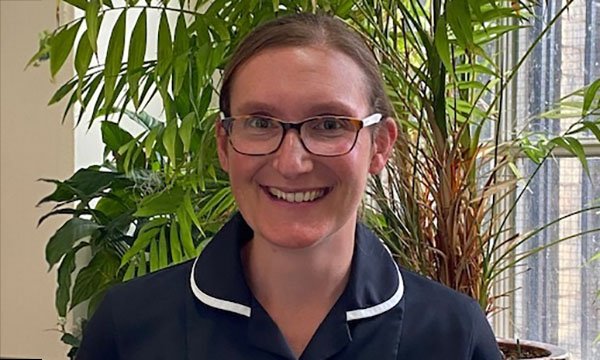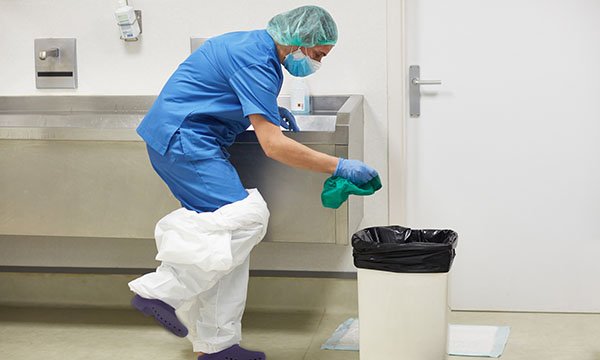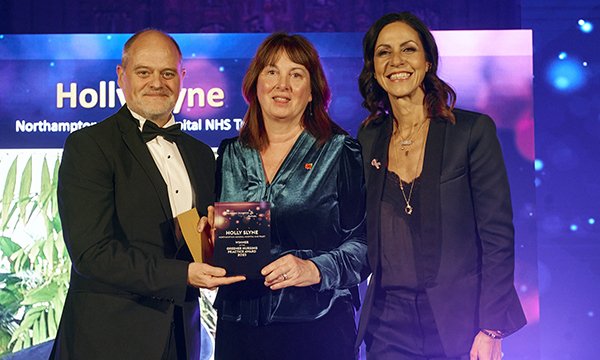Greener infection control: how to take nurse colleagues with you
The RCN Nursing Awards 2023 Greener Nursing Practice award winner shares her tips for a successful campaign to reduce PPE use, with support from staff
- Greener Nursing Practice award winner Holy Slyne’s clever use of e-posters, online messages and TikTok videos helped build staff enthusiasm for a PPE reduction campaign
- Project to reduce glove and apron use resulted in savings on costs and CO2 emissions for trust and increased understanding of IPC measures among staff
- Tips on how to introduce a sustainability or greener nursing initiative in your area, including making it meaningful for staff members

A successful initiative to reduce unnecessary personal protective equipment (PPE) use and reset practices adopted in the COVID-19 pandemic has saved one hospital using more than 300kg of plastic.
When Northampton General Hospital NHS Trust associate director for infection prevention and control (IPC) Holly Slyne started her impressive project, she did not expect staff to embrace changes with huge enthusiasm. However, creating and sharing a training package through the clever use of e-posters, screensavers and TikTok videos inspired staff across the organisation – so much so, they queued up to ‘star’ in the short films.
Improving staff confidence to end over-reliance on gloves and aprons
The Be PPE Free campaign created by the hospital’s IPC team nurses not only gained positive feedback, but also boosted staff confidence to ditch unwarranted reliance on gloves and aprons, and reduced costs and carbon dioxide equivalent emissions.
‘As infection prevention control nurses, we had seen a big increase in poor practice, with staff overusing PPE, because they were so scared about COVID-19,’ Ms Slyne says. ‘The guidance changed so much during the pandemic, and they lost confidence in what they should do.

While PPE should be worn to ensure patient safety when staff are in contact with blood or body fluids, for example, Ms Slyne advises when assessing risk if you determine you are going to contaminate your hands, wear gloves, or if you will contaminate your uniform, wear an apron.
‘COVID took that thinking away through the panic element,’ she says. ‘We needed to get back to a common-sense approach.
‘We know that while gloves protect you, you pick up patients’ germs and then pass them on to the next patient if you wear them between tasks. We wanted to do more to keep patients safe from infection and then our trust ran the Green Team competition in conjunction with the Centre for Sustainable Healthcare.
‘We used this as a platform to focus and collect data and conduct a quality improvement project, so we could measure the impact and the outcomes.’
Eight trends in the overuse of gloves and aprons – and how they were identified
From observations and surveys, Ms Slyne identified eight trends in the overuse of gloves and aprons and led the creation of the training package to address these issues.
Always keen to support and push sustainability, she refreshed the trust’s PPE policy, sending it to all trust staff, and porters, domestic and catering staff were trained.
An audit was conducted on a medical and a surgical ward at Northampton General Hospital, where the PPE coordinator observed practice and documented when gloves and aprons were used, and when used inappropriately. Among the inappropriate use noted was when staff were:
- Taking blood pressures.
- Taking patient observations.
- Collecting linen.
- Wearing the same PPE between patients.
- Writing in notes.
- Transferring patients from bed to chair or off the ward.
- Making beds.
- Answering the ward phone.
Using that information, the team created eight simple videos to show how pathogens and infections transfer when staff keep gloves on inappropriately. ‘They show staff when they can be PPE-free confidently – they loved it,’ Ms Slyne says.
‘So many people wanted to star in the videos – a porter, a nursing student, a physiotherapist, and a patient were among those who took part. It was at a time when everyone was so fed up post-pandemic. It was a morale boost, which I think is partly why it was so successful.’
Other methods to communicate and get people on board
As it was crucial that the campaign should be sustainable, rather than using printed posters, e-posters were created and shared through screensavers across the trust.
‘After we audited to identify the eight key themes that staff were overusing, we generated these in the videos and e-posters. Teams use WhatsApp so we sent them to the matrons, ward sisters’ and managers’ WhatsApp groups.

‘People were so engaged they were asking what the next theme would be. They were really looking forward to it. I was amazed that there was no resistance to implementing change.’
‘I often think infection prevention teams can be seen as a blocker to sustainable change. There is a myth that we like single-use and disposable, but greener practice is something that we embrace’
Holly Slyne, Greener Nursing Practice award winner
Time is a challenge in an acute trust. To overcome this, Ms Slyne added the project to team members’ calendars, discussed time and availability with other staff and set realistic SMART goals (Specific, Measurable, Achievable, Relevant, Time-Bound) to ensure the project continued successfully despite other clinical and operational pressures.
Now the materials are shared with all new staff, including a one-page guide.
Measuring the impact of the Be PPE Free campaign
Greener Nursing Practice 2023 award winner and associate director for infection prevention and control Holly Slyne describes how the team measured the impact of the Be PPE Free campaign at Northampton General Hospital NHS Trust:
‘We checked the procurement data before the campaign and afterwards,’ Ms Slyne says. ‘Glove use reduced by 4.3% and aprons by 22.1%. It was a massive reduction in just eight weeks, from May to June 2022.’
The knowledge among staff regarding the use of personal protective equipment (PPE) also improved. In a questionnaire given to staff about where and when PPE should be used, 98% gave the correct answers after the campaign, Ms Slyne says, compared with 12% before.

This was also borne out in practice. ‘We did observational audits of practice, and inappropriate use had reduced by 66% on the medical ward and 100% on the surgical ward,’ she says. ‘It has given staff the confidence to know when it is okay to not wear PPE.’
In addition to improving staff awareness and infection protection for patients, the initiative is forecast to save 25,974kg carbon dioxide equivalent (CO2e) a year. This is equivalent to 74,809.9 miles driven in an average car (or 110 return journeys from Northampton to Glasgow).
This is also an average reduction of 96.5kg (gloves) and 222.1kg (aprons) of plastic per month, which equates to a yearly saving of £22,687.
How the project has reached other healthcare settings and groups
Ms Slyne, who was named winner of the Greener Nursing Practice award at the RCN Nursing Awards 2023 on Friday 10 November, is also delighted that the reach of the campaign has spread beyond Northampton.

‘We shared it on a regional NHS England IPC webinar and NHS England took it and scaled it up into The Gloves Are Off regional campaign and ran it over a whole year,’ she says.
Ms Slyne presented the initiative at several conferences, and has since been contacted by other trusts. She has also shared the work with the Sustainability Special Interest Group of the Infection Prevention Society, and across the integrated care system and throughout the hospital.
Climate conscious healthcare: 5 simple ways to be a greener nurseTips for communicating and gaining support for new initiatives
Advice from Greener Nursing Practice 2023 award winner Holly Slyne, associate director for infection prevention and control at Northampton General Hospital NHS Trust:
- Keep messages clear, simple and consistent when you implement any change
- Have a bit of fun It is important and helps engage people
- Ensure your approach is meaningful to the audience For our nurses, it is important that the initiative is preventing cross-infection. For others, the priority may be that it is sustainable or cost-saving, for example
- Make use of social media platforms All trusts have an electronic briefing system
- Work with staff, using familiar channels, rather than lecture to them
Seeing infection prevention and control goals in a sustainability context
Although initially started in the wards, the Be PPE Free campaign’s methodology has been used to look at PPE use in theatres and in the emergency department at the trust.
‘The buzz around it has been quite overwhelming,’ Ms Slyne says. ‘The reach has been fascinating. It was timely, as sustainable healthcare is a focus. Initially, our motivation was to protect patients from infection.
‘There has been such an increase in interest, particularly in the infection prevention arena not promoting single-use disposables, and to put the planet into the risk assessment of PPE use is also important.’
Of her award win, Ms Slyne says she is grateful to the judging committee for recognising the impact that has been achieved. ‘I think what we have learned from this is that there is so much more that we need to be doing to be sustainable in healthcare and in nursing.’
She is also proud to have helped reposition IPC at the forefront of the sustainability agenda.
‘This project opened our eyes that as IPC practitioners we can lead by example and showcase that change. I often think infection prevention teams can be seen as a blocker to sustainable change. There is a myth that we like single-use and disposable, but greener practice is something that we embrace.’
Meet the winners: more from the RCN Nursing Awards 2023